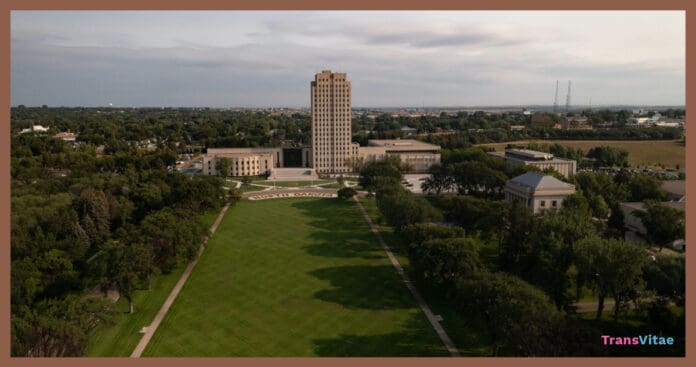Bismarck, ND In a decisive series of legislative actions, the North Dakota Senate has passed several bills with veto-proof majorities, introducing substantial restrictions on transgender rights across various facets of public life. These proposed laws span a wide range of areas, including sports participation, healthcare access, educational settings, workplace environments, and other aspects of daily life, placing them at the center of a national conversation on LGBTQ rights.
Under the new legislation, healthcare professionals in North Dakota would be barred from providing gender-affirming care to individuals under 18, a move that has drawn sharp criticism for potentially endangering the mental and physical health of transgender youth. Furthermore, transgender girls and women face exclusion from joining female sports teams at both the K–12 and collegiate levels.
This array of bills, should they withstand potential gubernatorial vetoes, represents a significant rollback of rights and protections for the transgender community.
Legislative Debate and Opinions
Democratic Sen. Ryan Braunberger of Fargo, openly sharing his personal journey and struggles with his identity, highlighted the dire consequences such legislation could have on the mental well-being of LGBTQ youth. Braunberger’s poignant testimony underscored the life-threatening impact of legal frameworks that alienate and stigmatize, reflecting a broader concern for the safety and acceptance of LGBTQ individuals in society.
Opponents of the bills have criticized them for being not only discriminatory but also for their potential conflicts with existing federal laws, adding to the complexity and enforceability of these measures. These criticisms point to a legal and ethical battleground that extends beyond state lines, implicating national standards of civil rights and equality.
Supporters, including Republican Sen. Janne Myrdal of Edinburg, argue from a perspective of caution regarding identity decisions in youth and advocate for the rights of non-transgender individuals. Citing examples from other states with similar legislation, Myrdal challenges the notion that these laws would lead to federal sanctions or negatively impact the state’s eligibility to host national sports events.
The legislative effort in North Dakota also extends to educational environments, with proposed amendments aimed at preventing the acknowledgment of the preferred pronouns of transgender students and government employees. This move, resurrecting provisions from previously vetoed legislation, symbolizes a broader push against transgender visibility and acceptance in public institutions.
Beyond sports and healthcare, the legislation seeks to regulate access to gender-segregated facilities like restrooms and locker rooms in schools, correctional facilities, and public buildings, further encroaching on the rights and dignities of transgender individuals. Another contentious aspect of the proposed laws would make it more difficult for transgender people to amend their gender identity on official documents, a change that could complicate various legal and personal processes for the affected individuals.
National Context and Presidential Response
This legislative campaign in North Dakota is part of a larger national trend where Republican lawmakers have introduced several hundred bills aimed at curtailing LGBTQ rights. These actions have prompted responses from the highest levels of government, with President Joe Biden denouncing the wave of legislation as “hateful and extreme” and an affront to American values. Biden’s statement emphasizes the exacerbation of the national mental health crisis due to these legislative attacks on transgender youth, calling for an end to such discriminatory practices.
As this situation unfolds, the broader implications for the rights, health, and wellbeing of transgender individuals remain a focal point of concern. The dialogue surrounding these bills, characterized by both professional critique and empathetic support, reflects the ongoing struggle for equality and acceptance faced by the transgender community and their allies.


